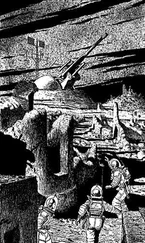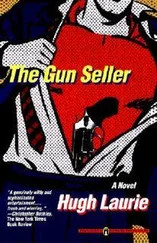Hotel Company stood. It had suffered miserably. Five Marines were dead, thirty were wounded. 73Private First Class Nickelson had survived. He rose to his feet but left his jammed rifle in the dirt. He had arrived in Vietnam a month before. Until that day, he had never handled this kind of rifle. In the United States, the Marine Corps had trained him on an M-14. In his one previous firefight, his M-16 had jammed, too—after firing a single round. He had been in two firefights against NVA soldiers with automatic rifles, and he had managed to fire only three rounds back. What good was a rifle that did not work? Nickelson was new to war. He was no fool. He understood this was not right. A rifle that failed in battle was worse than useless. It was detestable. As far as he was concerned it was a discard. Upon arriving in Vietnam and before being assigned to the battalion, Nickelson had bought a .38 revolver from a soldier who was rotating home. He would carry that until the Marine Corps could give him a rifle he could trust.
An officer ordered him to pick up his M-16. Nickelson was incredulous.
“ Fuck you,” he said.
An argument broke out at the edge of the smoking village. Nickelson refused to carry a rifle that did not work. Other Marines intervened. Hotel Company had enough problems. A compromise was reached—he would carry an M79 grenade launcher. Someone produced his new weapon. The Marine who had carried it had been shot; it was available for anyone else’s use. Nickelson slung it and walked into Ap Sieu Quan. The village had been partially rubbled. Shattered ceramic roofing tiles littered the ground. Blood-splattered trails showed where the North Vietnamese soldiers had dragged their dead away. A few chickens wandered the scene, the only remaining inhabitants. The Marines caught them, lit a fire from bits of rubble, and began to cook their birds. Nickelson settled into his new weapon. He would never carry an M-16 again.
By the time helicopters flew back to the USS Tripoli on July 26, the mood in Hotel Company was dark. The company’s executive officer, Lieutenant Chervenak, had queried each platoon in Ap Sieu Quan and learned that forty rifles had jammed during the battle. Forty rifles. Roughly a quarter of the company had been under fire and unable to fight back. The officers in other companies in Second Battalion, Third Marines told him of similar problems in their own firefights during Operation Bear Chain.
Lieutenant Chervenak, lean and athletic, had taken a roundabout route to the infantry. Raised in west central Pennsylvania, he had been the quarterback of his high school football team, and then attended Pennsylvania State University on a military scholarship. After he completed the basic infantry course required of all Marine officers, the Corps assigned him to naval flight school in Pensacola, Florida. He hoped to fly jets. It was not to be. The Marine Corps needed more pilots for helicopters than for jets. He was assigned to the helicopter course. An assignment to flight school was coveted, one of the professional plums for a young military officer in the United States. When Lieutenant Chervenak learned he would not fly jets, he immediately did something officers in good standing at flight school rarely do. He quit. He asked for orders to the infantry. Soon he was en route to Vietnam. 74
In May 1967, he arrived in Okinawa as one of the replacements assigned to restore the battalion to fighting strength after the fights for Hills 861 and 881. For the first time he saw an M-16. He started hearing the harrowing accounts. He also discovered that troops were buying M-14s from rear-echelon and aviation units that still carried them. Lieutenant Chervenak was new to the unit; he reserved judgment until he could see M-16s in action himself. But he sensed something was deeply wrong. The Marine Corps was organized around its rifles. The rifleman was at the center of its identity, training, and lore. And Marines were trying to get their rifles on a black market?
The Corps’ reaction similarly stumped him. The Marine Corps had not been interested in the M-16 throughout the early 1960s. 75But once the Pentagon took its decision, the Corps’ generals adopted the Beltway stance. A din of complaints about M-16 jamming had risen from the ranks. The generals’ replies mixed paternalistic denials that the M-16 was failing with strong defenses of the weapon’s merits. The senior officers followed the army’s pattern: They blamed the troops for the weapons’ problems. At a press conference in Da Nang just after the battles for Hills 861 and 881, one highly decorated commander, Lieutenant General Lewis W. Walt of the Third Marine Amphibious Force, delivered a classic performance of an officer who has lost touch with his men. First he declared that the Marines in his command were “100 percent sold” on the M-16. Most of those who had relied on the weapon in battle, he added, “have nothing but praise for it.” This can be read only as a lie. General Walt pressed on. He put blame for malfunctions squarely upon individual Marines and their officers and noncommissioned officers, saying they either had not adequately maintained their rifles or had tried to force too many rounds into their magazines. This was a slap at the men at war. In a booming slip of the tongue, General Walt added that “rumors” of unsatisfactory M-16 performance were started “by a very, very small majority.” 76Not long after the press conference, General Walt was reassigned to Washington and elevated to the post of the Corps’ assistant commandant. In July, the commandant of the Marine Corps, General Greene, repeated General Walt’s position, calling the M-16 “ideally suited” for the jungle warfare of Vietnam. The brass had set a tone. With the generals standing behind the M-16, complaints had little chance of finding a supporting audience. The young Marines in Vietnam were on their own.
The brass’s position was reflected down the chain of command and in the army, too. One officer responsible for the Twenty-fifth Infantry Division’s public statements described an official prohibition against mentioning M-16 malfunctions. This was a subject not to be broached in any army comments or in conversations with journalists, along with other topics officially deemed too unsettling for the public’s ears: “the defeat of U.S. units,” “B-52 and other bombing errors,” “female VC,” “very young VC,” and the “use of flamethrowers, hand-held or track-mounted.”
MACV31 told all information officers prior to my arrival that the M16 was not a topic for discussion. Newsmen were not to question soldiers about the weapon. No stories about the rifle jamming or malfunctioning were to be written.
This was done despite the fact that many GIs hated the M16, felt they couldn’t trust it. And until an order stopped the procedure, carried their own weapons instead: carbines, 45 caliber grease guns, rifles sent from home, captured AK47s, et cetera.
At the same time the Army launched an all out propaganda campaign to make GIs in Vietnam more confident in the weapon they basically mistrusted. Special classes on the weapon were held in the units, new cleaning procedures were instigated, new lubricating materials were introduced…. A whole new campaign was initiated to instill in the American soldier the utmost confidence in a weapon that he didn’t like. 77
The Marines in General Walt’s small majority, meanwhile, suffered on. They knew the truth was being suppressed. After being brought back to fighting strength in May, Second Battalion, Third Marines embarked on ships and sailed again toward Vietnam. While en route, the officers organized their own tests. The enlisted Marines cleaned their weapons repeatedly over several days. The fire team leaders and squad leaders looked over each rifle. On the ship’s flight deck, platoon sergeants and platoon commanders inspected the rifles again. Each was parade-ground clean. Then the company commander and either the battalion commander or battalion executive officer repeated the step. At last the Marines were allowed to fire their M-16s off their ship’s fantail. As many as 40 percent of the rifles jammed. 78
Читать дальше











